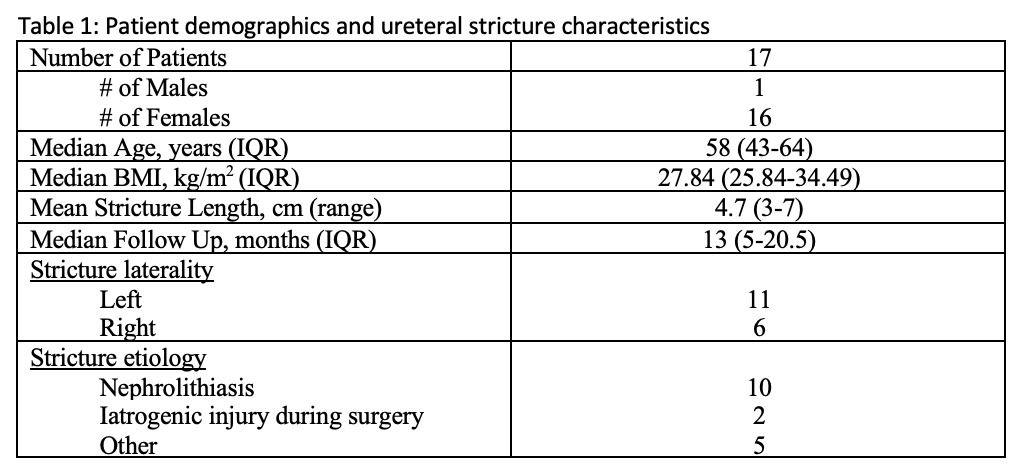Back
Poster, Podium & Video Sessions
Moderated Poster
MP25: Trauma/Reconstruction/Diversion: Ureter (including Pyeloplasty) and Bladder Reconstruction (including fistula), Augmentation, Substitution, Diversion
MP25-12: Robotic Buccal Graft Ureteroplasty Without Ureteral Rest
Saturday, May 14, 2022
10:30 AM – 11:45 AM
Location: Room 228
Shellee Ogawa*, Wesley Baas, Kushan Radadia, Alexander Parker, Kefu Du, Eric Kim, Robert Figenshau, Gregory Murphy, ST LOUIS, MO
- SO
Shellee L. Ogawa, MD
Washington University School of Medicine, St. Louis, MO
Poster Presenter(s)
Introduction: Robotic buccal graft ureteroplasty (RBGU) is a promising technique for ureteral reconstruction with growing evidence to support its use. Ureteral rest prior to ureteral reconstruction is often advocated by experts in the field. We describe our experience with RBGU at our institution without ureteral rest, focusing on perioperative management and outcomes to add to the growing body of literature for this approach.
Methods: We retrospectively reviewed patients who underwent RBGU at our institution from March 2018 to September 2021. Demographic information, operative details, and complications were recorded. All strictures were initially evaluated with retrograde pyelography and, when feasible, ureteroscopy to delineate stricture length and location. In all patients, a 6F ureteral stent was left in place preoperatively to improve the quality of the ureteral plate. After surgery, a stent was left in place for six weeks. Removal was initially done in clinic but is now done in the OR with retrograde pyelography. Patients were followed with renal ultrasound and, if necessary, renal scintigraphy.
Results: Seventeen patients were identified with a median age of 58 years (IQR 43-64). Median stricture length was 4.7cm (range 3-7cm). Median length of follow up was 13 months (IQR 5-20.5). All but one stent was removed at six weeks; the exception was due to a persistent leak on retrograde pyelography which resolved by ten weeks. Complications included one stricture recurrence/urinoma, one bowel obstruction which resolved with conservative measures, two UTIs and one readmission for pain control. Two patients had recurrent stone episodes requiring ureteroscopy. Overall success rate, defined as lack of stricture recurrence, was 93.3%.
Conclusions: RBGU is a safe and effective procedure for management of complex ureteral strictures. Despite emerging evidence in support of ureteral rest, our series demonstrates low rates of recurrence without ureteral rest with moderate follow up. We believe preoperative stenting is not inferior to ureteral rest and is better tolerated by patients.
Source of Funding: None

Methods: We retrospectively reviewed patients who underwent RBGU at our institution from March 2018 to September 2021. Demographic information, operative details, and complications were recorded. All strictures were initially evaluated with retrograde pyelography and, when feasible, ureteroscopy to delineate stricture length and location. In all patients, a 6F ureteral stent was left in place preoperatively to improve the quality of the ureteral plate. After surgery, a stent was left in place for six weeks. Removal was initially done in clinic but is now done in the OR with retrograde pyelography. Patients were followed with renal ultrasound and, if necessary, renal scintigraphy.
Results: Seventeen patients were identified with a median age of 58 years (IQR 43-64). Median stricture length was 4.7cm (range 3-7cm). Median length of follow up was 13 months (IQR 5-20.5). All but one stent was removed at six weeks; the exception was due to a persistent leak on retrograde pyelography which resolved by ten weeks. Complications included one stricture recurrence/urinoma, one bowel obstruction which resolved with conservative measures, two UTIs and one readmission for pain control. Two patients had recurrent stone episodes requiring ureteroscopy. Overall success rate, defined as lack of stricture recurrence, was 93.3%.
Conclusions: RBGU is a safe and effective procedure for management of complex ureteral strictures. Despite emerging evidence in support of ureteral rest, our series demonstrates low rates of recurrence without ureteral rest with moderate follow up. We believe preoperative stenting is not inferior to ureteral rest and is better tolerated by patients.
Source of Funding: None


.jpg)
.jpg)